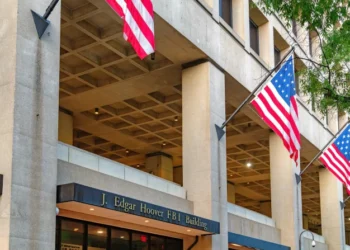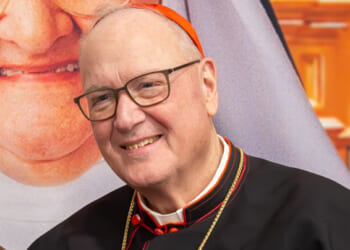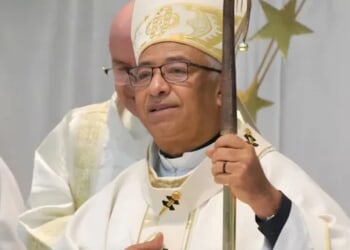
November, the month of the dead, calls us to remember our own death and to prepare for eternal life. We may be tempted to think of this preparation in minimalist terms—avoiding mortal sin and fulfilling a basic set of obligations, such as attending Sunday Mass.
We could call this an “avoid Hell” approach. Purgatory might linger in the back of our minds as a kind of insurance policy, a last-ditch means of making up for lost opportunities and loose ends. Aiming directly for Heaven, well, that feels like a tall order, something reserved for canonized saints.
Yet, this, and nothing less, is our vocation, even if we need to be cleansed of the effects of sin before seeing God face to face. Remaining focused on Heaven can guide the steps of our earthly pilgrimage and spur us on to deeper preparation.
What if we could visit Hell, Purgatory, and Heaven? Wouldn’t that open our eyes and put life into an entirely different and eternal perspective?
Some saints were given this grace, like St. Francesca of Rome and St. Christina the Astonishing, but we must follow a different path, more akin to Dante’s, relying on our imagination for a meditative journey. It’s not simply a matter of meditating upon three different places as much as three different states that arise from our thoughts, desires, and choices. Dante takes this approach in his Divine Comedy, envisioned as a great jubilee year pilgrimage, set in the Church’s first jubilee year, 1300.
Even though his Inferno seems, at first glance, to reflect an almost grotesque interest in the suffering of other souls, the supreme poet makes it abundantly clear that his journey to the afterlife was taken not as a tourist but for the good of his own soul, serving as a catalyst to purify his loves and to enable him to contemplate the divine. He needed to see the flames of Hell to realize how its punishments arose precisely from life on earth.
We can begin our own imaginative pilgrimage, as Dante does, by meditating on Hell. Rather than the fear of potential torments, its reality begins in the wounds we carry deep within, painful memories of estrangement from God and those close to us, and, even now, disordered desires that, if left unchecked, would overrun us and wreak havoc in our lives. Imagine what you would be like if all that is broken and unruly within you were to take over.
What if you turned your back on God and hurt others for your own advantage? This path would lead to a horrible distortion of your person and would create a place in Hell that fits the darkness allowed to dominate you. St. Teresa of Avila describes in her Autobiography how she saw a little hole where she herself would end up were it not for the mercy of God:
The entrance seemed to be by a long, narrow pass, like a furnace, very low, dark and close. … At the end was a hollow place in the wall, like a closet, and in that I saw myself confined. All this was even pleasant to behold in comparison with what I felt there. … But as to what I then felt, I do not know where to begin, if I were to describe it; it is utterly inexplicable. I felt a fire in my soul. I cannot see how it is possible to describe it. My bodily sufferings were unendurable. (ch. 32)
We, too, create a little hole that will await us if we do not check our evil inclinations and continually lift our minds and hearts toward the light of Christ.
As part of this lifting up, Purgatory should commence now as we make reparation for sin, experience reconciliation, and cooperate with the Lord’s healing grace. Dante’s ascent of Mount Purgatory focused on the seven deadly sins and how these must be overcome through penance to rightly order the soul to God through corresponding virtues. You can picture yourself carrying the baggage of past sins, weighed down by bad habits that are difficult to break. On the other hand, imagine the opportunities you have to serve, to give of yourself sacrificially to others, to grow in humility, patience, and other virtues.
St. Catherine of Genoa, at the beginning of her Treatise on Purgatory, reflects that she was able to enter into the same purging fire the holy souls already in this life: “This holy soul found herself, while still in the flesh, placed by the fiery love of God in Purgatory, which burnt her, cleansing whatever in her needed cleansing, to the end that when she passed from this life she might be presented to the sight of God, her dear Love.” Now is the time to make up for all our missed opportunities, to atone for them, and to make a new start by taking up the Cross and dying to ourselves daily.
And finally, we can reflect on what it would look like for our potential to develop to its full capacity. We often think of the great accomplishment we might be able to achieve. The novelist Leon Bloy, however, famously remarked that “the only real sadness, the only real failure, the only great tragedy in life, is not to become a saint.” Saints are the ones who are fully alive because Christ has begun to live within them through an absolute abandonment to God’s will and service of others.
Meditating on Heaven requires us to shift our perspective to what matters most in this life. St. Faustina relates an experience of Heaven in her diary:
And God has given me to understand that there is but one thing that is of infinite value in his eyes, and that is love of God; love, love and once again, love; and nothing can compare with a single act of pure love of God. Oh, with what inconceivable favors God gifts a soul that loves him sincerely! Oh, how happy is the soul who already here on earth enjoys his special favors! And of such are the little and humble souls. (778)
We can embrace Heaven on earth if we’re willing to die to this world, giving up good things now in exchange for infinitely greater things to come.
To recap this pilgrimage, we can journey to the afterlife through meditative prayer, shedding light on the hidden darkness within us, seeking to overcome it by ascending out of bad habits, and embracing God’s will for us to live, even now, enveloped by his loving and transforming mercy.
If you value the news and views Catholic World Report provides, please consider donating to support our efforts. Your contribution will help us continue to make CWR available to all readers worldwide for free, without a subscription. Thank you for your generosity!
Click here for more information on donating to CWR. Click here to sign up for our newsletter.











